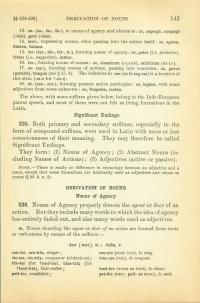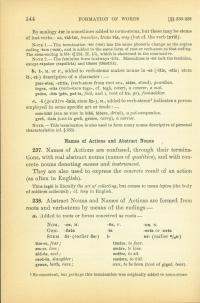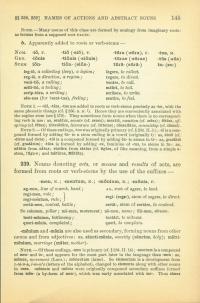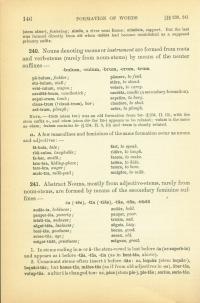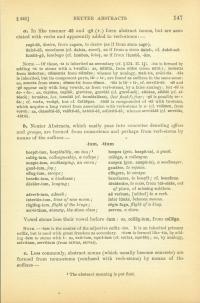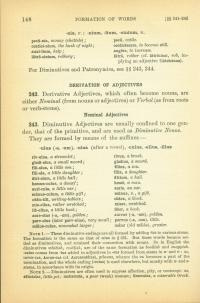Nouns of Agency
236. Nouns of Agency properly denote the agent or doer of an action. But they include many words in which the idea of agency has entirely faded out, and also many words used as adjectives.
a. Nouns denoting the agent or doer of an action are formed from roots or verb stems by means of the suffixes.
| -tor (-sor) [m.], -trīx [f.] | |
| can-tor, can-trīx singer |
can-ere (root CAN) to sing |
| vic-tor, vic-trīx conquerer (victorious) |
vinc-ere (VIC) to conquer |
| tōn-sor (for †tōnd-tor) tōns-trīx (for †tōns-trix) hair-cutter |
tond-ēre (root TOND) to shear |
| petī-tor candidate |
pet-ĕre (PET; stem petī-) to seek |
By analogy -tor is sometimes added to noun stems, but these may be stems of lost verbs.
viā-tor traveller, from via way (but cf. the verb inviō)
Note 1— The termination -tor (-sor) has the same phonetic change as the Supine ending -tum (-sum), and is added to the same form of root or verb stem as that ending. The stem-ending is tōr- (§ 234.2.15), which is shortened in the nominative.
Note 2— The feminine form is always -trīx. Masculines in -sor lack the feminine, except expulsor (expultrīx) and tōnsor (tōnstrīx).
b. t- (m.) or (f.), added to verb stems makes nouns in -es (-itis; -etis; stem it-, et-) descriptive of a character.
prae-stes, -stitis guardian
(verb stem from root STA, stāre stand)
teges, -etis a coverer, a mat
(verb stem tege-, cf.tegō cover)
pedes, -itis foot-soldier
(pēs, ped-is foot, and ī-, root of īre go)
c. -ō (Genitive -ōnis, stem ōn-) [m.], added to verb stems1 indicates a person employed in some specific art or trade.
com-bibō a drinking companion
(root BIB, as in bibō, bibere drink)
gerō, -ōnis a carrier
(GES in gerō, gerere carry)
Note— This termination is also used to form many nouns descriptive of personal characteristics (cf. § 255).
Names of Actions and Abstract Nouns
237. Names of Actions are confused, through their terminations, with real abstract nouns (names of qualities), and with concrete nouns denoting means and instrument.
They are also used to express the concrete result of an action (as often in English).
Thus legiō is literally the act of collecting, but comes to mean legion (the body of soldiers collected); cf. levy in English.
238. Abstract Nouns and Names of Actions are formed from roots and verb stems by means of the endings.
a. Added to roots or forms conceived as roots—
| NOM. | -or [m.] | -ēs [f.] | -us, n. |
| GEN. | -ōris | -is | -eris or -oris |
| STEM | ōr- (earlier ōs-) | i- | er- (earlier (e/os-) |
| tim-or fear | timēre to fear |
| am-or love | amāre to love |
| sēd-ēs seat | sedēre to sit |
| caed-ēs slaughter | caedere to kill |
| genus birth, race | [GEN] to be born (root of gignō bear) |
Note— Many nouns of this class are formed by analogy from imaginary roots.
facinus [from a supposed root FACIN]
b. Apparently added to roots or verb stems.
| NOM. | -iō, [f.] | -tiō (-siō) [f.] | -tūra (-sūra) [f.] | -tus [m.] |
| GEN. | -iōnis | -tiōnis (-siōnis | -tūrae (-sūrae) | -tūs (-sūs) |
| STEM | iōn- | tiōn- (siōn-) | tūrā- (sūrā-) | tu- (su-) |
| leg-iō a collecting (levy), a legion | leger to collect |
| reg-iō a direction, a region | regere to direct |
| vocā-tiō a calling | vocāre to call |
| mōlī-tiō a toiling | mōlīrī to toil |
| scrīp-tūra a writing | scrībere to write |
| sēn-sus (for †sent-tus) feeling | sentīre to feel |
Note 1— -tiō, -tūra, -tus are added to roots or verb stems precisely as -tor, with the same phonetic change (cf. § 236.a, Note 1 above). Hence they are conveniently associated with the supine stem (see § 178). They sometimes form nouns when there is no corresponding verb in use.
senātus senate (cf. senex)
mentiō mention (cf. mēns
fētūra offspring (cf. fētus)
litterātūra literature (cf. litterae)
cōnsulātus consulship (cf. cōnsul)
Note 2— Of these endings, -tus was originally primary (cf. § 234.2.3); -iō is a compound formed by adding ōn- to a stem ending in a vowel (originally i).
diciō (cf. -dicus and dicis)
-tiō is a compound formed by adding ōn- to stems in ti-.
gradātiō (cf. gradātim)
-tūra is formed by adding -ra, Feminine of -rus, to stems in tu-.
nātūra from nātus
statūra from status (cf. figūra, of like meaning, from a simple u- stem, †figu-s; and mātūrus, Mātūta).
239. Nouns denoting acts , or means and results of acts, are formed from roots or verb stems by the use of the suffixes.
| -men, [n.], -mentum, [n.], mōnium, [n.], mōnia [f.] | |
| ag-men line of march, band | root AG, agere to lead |
| regi-men rule regi-mentum rule |
regi- (rege-), stem of regere to direct |
| certā-men contest, battle | certā-, stem of certāre to contend |
So colu-men (pillar), mō-men (movement), nō-men (name), and flū-men (stream).
| testi-mōnium testimony | testārī to witness |
| queri-mōnia complaint | querī to complain |
-mōnium and -mōnia are also used as secondary, forming nouns from other nouns and from adjectives.
sānctimōnia sanctity (sānctus holy)
mātrimōnium marriage ( māter mother)
Note— Of these endings, -men is primary (cf. § 234.2.14); -mentum is a compound of men- and to-, and appears for the most part later in the language than -men.
mōmen movement (Lucr.)
mōmentum (later)
So elementum is a development from L-M-N-a, l-m-n's (letters of the alphabet), changed to elementa along with other nouns in -men. -mōnium and -mōnia were originally compound secondary suffixes formed from mōn- (a by-form of men-), which was early associated with mo-.
almus (stem almo-) fostering
Almōn (a river near Rome)
alimōnia support
But the last was formed directly from alō when -mōnia had become established as a supposed primary suffix.
240. Nouns denoting means or instrument are formed from roots and verb stems (rarely from noun stems) by means of the neuter suffixes.
| -bulum, -culum, -brum, -crum, -trum | |
| pā-bulum fodder | pāscere to feed |
| sta-bulum stall | stāre to stand |
| vehi-culum wagon | vehere to carry |
| candēlā-brum candlestick | candēla candle (a secondary formation) |
| sepul-crum tomb | sepelīre to bury |
| claus-trum (†claud-trum) bar | claudere to shut |
| arā-trum plough | arāre to plough |
Note— -trum (stem tro-) was an old formation from tor- (§ 234.2.15), with the stem suffix o-, and -clum (stem clo- for tlo-) appears to be related; -culum is the same as -clum; -bulum contains lo- (§ 234.II.9-10) and -brum is closely related.
a. A few masculines and feminines of the same formation occur as nouns and adjectives.
| fā-bula tale | fārī to speak |
| rīdi-culus laughable | rīdēre to laugh |
| fa-ber smith | facere to make |
| late-bra hiding-place | latēre to hide |
| tere-bra auger | terere to bore |
| mulc-tra milk pail | mulgēre to milk |
241. Abstract Nouns, mostly from adjective stems, rarely from noun stems, are formed by means of the secondary feminine suffixes.
| -ia (-iēs), -tia (-tiēs), -tās, -tūs, -tūdō | |
| audāc-ia boldness | audāx bold |
| pauper-iēs poverty | pauper poor |
| trīsti-tia sadness | trīstis sad |
| sēgni-tiēs laziness | sēgnis lazy |
| boni-tās goodness | bonus good |
| senec-tūs age | senex old |
| māgni-tūdō greatness | māgnus great |
1. In stems ending in o- or ā- the stem vowel is lost before -ia (as superb-ia) and appears as i before -tās, -tūs, -tia (as in boni-tās, above).
2. Consonant stems often insert i before -tās:
loquāx (stem loquāc-), loquāci-tās
BUT
hones-tās
mâies-tās (as if from old adjectives in -es)
ūber-tās
volup-tās
O after i is changed to e.
pius (stem pio-), pie-tās
socius, socie-tās
a. In like manner -dō and -gō (f.) form abstract nouns, but are associated with verbs and apparently added to verb-stems.
cupī-dō desire from cupere to desire
(as if from stem cupī-)
dulcē-dō sweetness, cf. dulcis sweet
(as if from a stem dulcē-, cf. dulcē-scō)
lumbā-gō lumbago, cf. lumbus loin
(as if from †lumbō, -āre)
Note— Of these, -ia is inherited as secondary (cf. § 234.2.11). -tia is formed by adding -ia to stems with a t suffix:
mīlitia, from mīles (stem mīlit-)
molestia from molestus
clēmentia from clēmēns
whence by analog, mali-tia, avāri-tia. -tās is inherited, but its component parts, tā- + ti-, are found as suffixes in the same sense.
senecta from senex
sēmen-tis from sēmen
-tūs is tū- + ti-, cf. servitū-dō. -dō and -gō appear only with long vowels, as from verb stems, by a false analogy; but -dō is do- + ōn-
cupidus, cupīdō
gravidus, gravēdō (cf. gravē-scō)
albidus, albēdō (cf. albēscō)
formidus hot, formīdō (cf. formīdulōsus), (hot flash?) fear
-gō is possibly co- + ōn-; cf. vorāx, vorāgō, but cf. Cethēgus. -tūdō is compounded of -dō with tu- stems, which acquire a long vowel from association with verb stems in u- (cf. volūmen, from volvō):
cōnsuētū-dō, valētū-dō, habitū-dō
whence servitūdō (cf. servitūs, -tūtis).
b. Neuter Abstracts, which easily pass into concretes denoting offices and groups, are formed from noun stems and perhaps from verb stems by means of the suffixes.
| -ium, -tium | |
| hospit-ium hospitality, an inn2 |
hospes (gen. hospit-is) a guest |
| collēg-ium colleagueship, a college |
collēga a colleague |
| auspic-ium soothsaying an omen |
auspex (gen. auspic-is) a soothsayer |
| gaud-ium joy |
gaudēre to rejoice |
| effug-ium escape |
effugere to escape |
| benefic-ium a kindness |
benefacere to benefit cf. beneficus |
| dēsīder-ium longing |
dēsīderāre to miss from †dē-sīdēs out of place [of missing soldiers] |
| adverb-ium adverb |
ad verbum [added] to a verb |
| interlūn-ium time of new moon |
inter lūnās between moons |
| rēgifug-ium flight of the kings |
rēgis fuga flight of a king |
| servi-tium slavery the slave class |
servus a slave |
Vowel stems lose their vowel before -ium
collēg-ium, from collēga
Note— -ium is the neuter of the adjective suffix -ius. It is an inherited primary suffix, but is used with great freedom as secondary. -tium is formed like -tia, by adding -ium to stems with t.
exit-ium
equit-ium (cf. exitus, equitēs)
So, by analogy, calvitium and servitium (from calvus, servus).
c. Less commonly, abstract nouns (which usually become concrete) are formed from noun stems (confused with verb stems) by means of the suffixes.
| -nia [f.]; -nium, lium, cinium [n.] | |
| pecū-nia money (chattels) |
pecū cattle |
| contici-nium the hush of night |
conticēscere to become still |
| auxi-lium help |
augēre to increase |
| lātrō-cinium robbery |
latrō robber cf. latrōcinor rob (implying an adjective †latrōcinus) |
For Diminutives and Patronymics, see §§ 243-244.

